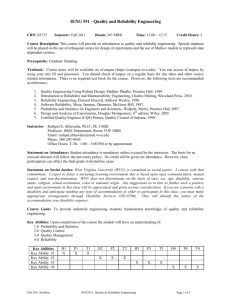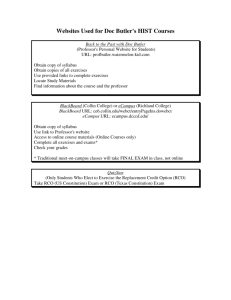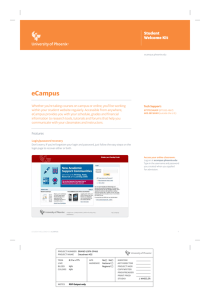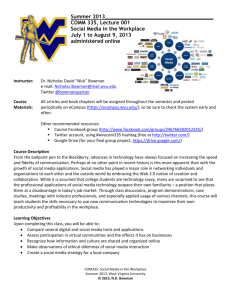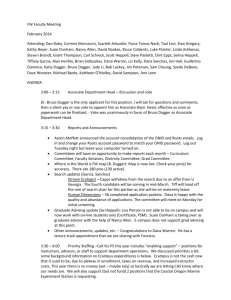International Organization Instructor Information: Course Information
advertisement
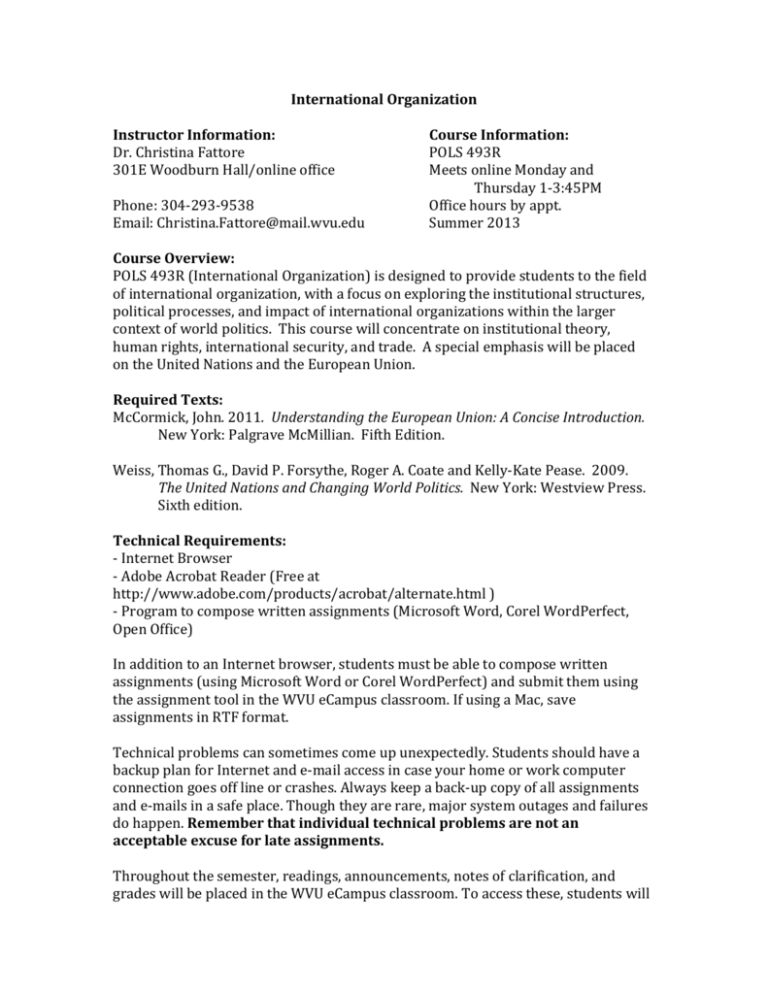
International Organization Instructor Information: Dr. Christina Fattore 301E Woodburn Hall/online office Course Information: POLS 493R Meets online Monday and Thursday 1-­‐3:45PM Office hours by appt. Summer 2013 Phone: 304-­‐293-­‐9538 Email: Christina.Fattore@mail.wvu.edu Course Overview: POLS 493R (International Organization) is designed to provide students to the field of international organization, with a focus on exploring the institutional structures, political processes, and impact of international organizations within the larger context of world politics. This course will concentrate on institutional theory, human rights, international security, and trade. A special emphasis will be placed on the United Nations and the European Union. Required Texts: McCormick, John. 2011. Understanding the European Union: A Concise Introduction. New York: Palgrave McMillian. Fifth Edition. Weiss, Thomas G., David P. Forsythe, Roger A. Coate and Kelly-­‐Kate Pease. 2009. The United Nations and Changing World Politics. New York: Westview Press. Sixth edition. Technical Requirements: -­‐ Internet Browser -­‐ Adobe Acrobat Reader (Free at http://www.adobe.com/products/acrobat/alternate.html ) -­‐ Program to compose written assignments (Microsoft Word, Corel WordPerfect, Open Office) In addition to an Internet browser, students must be able to compose written assignments (using Microsoft Word or Corel WordPerfect) and submit them using the assignment tool in the WVU eCampus classroom. If using a Mac, save assignments in RTF format. Technical problems can sometimes come up unexpectedly. Students should have a backup plan for Internet and e-­‐mail access in case your home or work computer connection goes off line or crashes. Always keep a back-­‐up copy of all assignments and e-­‐mails in a safe place. Though they are rare, major system outages and failures do happen. Remember that individual technical problems are not an acceptable excuse for late assignments. Throughout the semester, readings, announcements, notes of clarification, and grades will be placed in the WVU eCampus classroom. To access these, students will need to enter the electronic classroom regularly (at least three times each week). Detailed instructions are available at https://ecampus.wvu.edu/ . Be certain to do a browser check-­‐up so that you will be able to see and access all the features in the WVU eCampus classroom. If you have a technical problem or cannot enter the WVU eCampus classroom, contact the OIT Help Desk by phone at 304-­293-­4444 or online at http://oit.wvu.edu/support/helpdesk/index.html . Be certain to request and note your “trouble ticket” number which will be used to verify any claims of a system failure. This class will use the WIMBA live classroom. You must be able to access and use the WIMBA live classroom software. To get the most out of the WIMBA experience, a headset (microphone and headphones all in one) is recommended, but not required. Lectures will be every Monday and Thursday from 1:00pm-­‐3:45pm. More information about how to use WIMBA is available on the WIMBA Classroom Getting Ready Guide found in the “WIMBA Live Classroom” folder on the homepage of our course. Course Requirements: Discussion (20 percent): Discussion boards are an essential part of this online course. They are designed to stimulate thought, distribute information, clarify concepts, share ideas, explore course materials in detail, and to examine the course concepts from a new or different perspective. Simply logging on and saying “I agree” or “I disagree” does not constitute effective participation. You must actively engage in the class by asking questions or making observations. Participation in online class discussions is crucial and is to the benefit of each student. The materials assigned and covered, as well as additional subjects covered in class, are the responsibility of the student. Each Monday and Thursday, a discussion question will be posted on the discussion board. Students will have until the next Monday at noon to post a response to the question. You are to discuss this posting as well as read your fellow classmates postings and respond to at least two of your classmates’ comments. In other words, each of you need to do at least one post and at least two replies to classmates. However, simply completing one post and two replies does not guarantee full credit. Quality matters. Questions are worth a total of ten (10) points per week. There will be ten questions posted through the semester. Any student who does not post a response to the discussion question by noon the next Monday will receive a zero for that week. There are no make-­‐ups on discussion questions without prior approval from the instructor. Remember: Some of the topics have no right or wrong answer. It is fine to disagree. However, be respectful of your classmates’ opinions. Expect different beliefs and perspectives. Your classmates may express ideas that are foreign to you because this class is diverse. If you disagree with someone, disagree with their ideas. Listen and learn from your fellow students! Midterm exam (30 percent) and Final Exam (30 percent): Exams will consist of essay questions and will be distributed the class before the due date. Research paper (20%): Each student will write an 8-­‐10 page research paper on a topic of their choosing related to international organization. The topic must be approved by the professor by Thursday, July 11. The paper itself is due on Monday, July 29. Final Grade Calculations: Midterm Exam 30% Final Exam 30% Discussion forums 20% Research Paper 20% Total 100% Grade distribution: A (90-­‐100); B (80-­‐89); C (70-­‐79); D (60-­‐69); F (0-­‐59). No pluses or minuses are used. Social Justice Statement: West Virginia University is committed to social justice. The instructor concurs with that commitment and expects to maintain a positive learning environment based upon open communication, mutual respect, and non-­‐discrimination. West Virginia University does not discriminate on the basis of race, sex, age, disability, veteran status, religion, sexual orientation, color, or national origin. Any suggestion as to how to further such a positive and open environment in this class will be appreciated and given serious consideration. If you are a person with a disability and anticipate needing any type of accommodation in order to participate in this class, please advise the instructor within the first week of class to make appropriate arrangements. Please contact Disability Services (293-­‐6700) with any questions. Class Cancellation for Weather and Other Emergencies: At sometime during the semester it may be necessary for the University to cancel all or some classes due to poor weather, power failures or other emergencies. Because of the very nature of an online class in which students are participating from all over the world, a University class cancellation or closure will not automatically apply in this course. The WVU eCampus will still be operational in times of a University shutdown. In times of a power outage or system wide failure, the instructor will make an announcement in the WVU eCampus classroom as soon as information becomes available. Assignment due dates are firm and will not automatically change if the University is closed. Always check the eCampus for updates and announcements concerning the class. Course Schedule: July 1: Intro to International Order and Organization • Bull, Hedley. 1977. The Anarchical Society: A Study of Order in World Politics Ch. 1 (on ecampus) • Milner, Helen. “The Assumption of Anarchy in International Relations Theory: A Critique.” • Wendt, Alexander. “Anarchy is What States Make of It: The Social Construction of Power Politics.” • Keohane, Robert O. “International Institutions: Two Approaches.” July 4: No class, Independence Day July 8: Regimes, Hegemons, and Norms • Krasner, Stephen D. “Structural Causes and Regime Consequences: Regimes as Intervening Variables.” • Keohane, Robert O. 1984. After Hegemony: Cooperation and Discord in the World Political Economy. Ch. 3 (on ecampus) • Haas, Ernst B. “Why Collaborate? Issue-­‐Linkage and International Regimes.” • Finnemore, Martha and Kathryn Sikkink. 1998. “International Norm Dynamics and Political Change.” International Organization 52(4): 887-­‐917. (on ecampus) July 11: The League of Nations, the UN and National Security • Armstrong, David, Lorna Lloyd, and John Redmond. 2004. International Organisation in World Politics. Ch. 2 (on ecampus) • Weiss et al. Ch. 1, 3, 5 • Paper topics must be approved by today July 15: United Nations and Human Rights • Weiss et al Ch. 4, 6, and 7 • Carpenter, R. Charli. 2003. “Women and Children First: Gender, Norms, and Humanitarian Evacuation in the Balkans, 1991-­‐95.” International Organization 57 (4): 661-­‐694. (on ecampus) • Neumayer, Eric. 2005. “Do International Human Rights Treaties Improve Respect for Human Rights?” Journal of Conflict Resolution 49 (6): 1-­‐29. (on ecampus) July 18: United Nations and Human Development • Weiss et al Ch. 9, 10, and 11 • Busby, Joshua W. 2007. “Bono Made Jesse Helms Cry: Jubilee 2000, Debt Relief, and Moral Action in International Politics.” International Studies Quarterly 51 (2): 247-­‐275. • Sachs, Jeffrey. 2005. The End of Poverty: Economic Possibilities for Our Time. Ch. 11 (on ecampus) July 22: No class, midterm due July 25: Regional Integration and the European Union • McCormick Ch. 1, 2, and 3 • Scharpf, Fritz. 1999. Governing in Europe: Effective and Democratic? Ch. 2 (on ecampus) July 29: European Union Institutions • McCormick Ch. 4 and 5 • Research paper due August 1: European Union and Policymaking • McCormick Ch. 6, 7, 8 August 5: Do International Organization Affect Behavior? • Downs, George W, David M. Rocke, and Peter N. Barsoom. 1996. “Is the Good News about Compliance Good News about Cooperation?” International Organization 50 (3): 379-­‐406. (on ecampus) • Mearshimer, John J. 1995. “The False Promise of International Institutions.” International Security 19 (3): 5-­‐49. (on ecampus) • Keohane, Robert O. and Lisa L. Martin. 1995. “The Promise of Institutionalist Theory.” International Security 20 (1): 39-­‐51. • Book review due this week August 8: No lecture, final exam due
